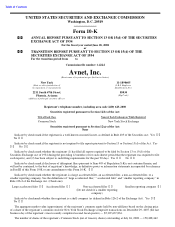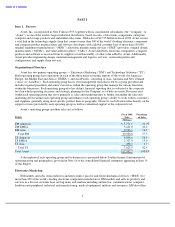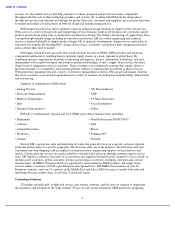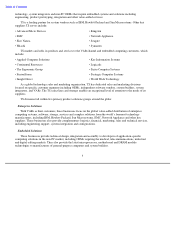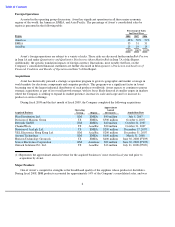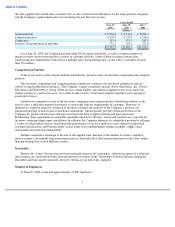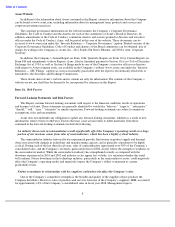Avnet 2008 Annual Report Download - page 13
Download and view the complete annual report
Please find page 13 of the 2008 Avnet annual report below. You can navigate through the pages in the report by either clicking on the pages listed below, or by using the keyword search tool below to find specific information within the annual report.
Table of Contents
personnel, capacity and other resources or a more extensive customer base than the Company has in one or more of
its market sectors.
The Company’s non-U.S. locations represent a significant and growing portion of its revenue, and
consequently, the Company is increasingly exposed to risks associated with operating internationally.
During fiscal year 2008, 2007 and 2006, approximately 52%, 50% and 49%, respectively, of the Company’s
sales came from its operations outside the United States. Most notable in this growth of non-U.S. sales is the
increasing volume of sales activity in the Asia region, which accounted for approximately 19% of consolidated sales
during fiscal year 2008. As a result of the Company’s foreign sales and locations, those in emerging and developing
economies in particular, the Company’s operations are subject to a variety of risks that are specific to international
operations, including, but not limited to, the following:
While the Company has and will continue to adopt measures to reduce the impact of losses resulting from
volatile currencies and other risks of doing business abroad, the Company cannot be assured that such measures will
be adequate or that its financial results will not be materially impacted as a result of increased costs of doing business
in those countries.
The Company’s acquisition strategy may not produce the expected benefits, which may adversely affect the
Company’s results of operations.
Avnet historically has pursued a strategic acquisition program to grow its global markets for electronic and
computer products. That program has enabled Avnet to solidify and maintain its leadership position in the market
place. During fiscal 2008 and through the date of this filing, Avnet has completed ten acquisitions. Risks and
uncertainties are inherent in the mergers and acquisition process in that such activities may divert management’s
attention from existing business operations. In addition, the Company may not be successful in integrating the
acquired businesses or the integration may be more difficult, costly or time-consuming than anticipated.
Consequently, the Company may experience disruptions that could have a material adverse effect on its business.
Furthermore, the Company may not realize all of the anticipated benefits from its acquisitions, which could adversely
affect the Company’s financial performance.
If the Company fails to maintain effective internal controls, it may not be able to report its financial results
accurately or timely or detect fraud, which could have a material adverse effect on the Company’s business or
stock price.
Effective internal controls are necessary for the Company to provide reasonable assurance with respect to its
financial reports and to effectively prevent fraud. If the Company cannot provide reasonable assurance with respect
to its financial reports and effectively prevent fraud, its brand and operating results could be harmed. Pursuant to the
Sarbanes-Oxley Act of 2002, the Company is required to furnish a report by management on internal control over
financial reporting, including management’s assessment of the effectiveness of such control. Internal control over
10
•
potential restrictions on the Company
’
s ability to repatriate funds from its foreign subsidiaries;
• foreign currency fluctuations and the impact on the Company’s reported results of operations of the
translation of the foreign currencies to U.S. dollars;
•
import and export duties and value
-
added taxes;
• compliance with foreign and domestic import and export regulations and anti-corruption laws, the failure of
which could result in severe penalties including monetary fines, criminal proceedings and suspension of
export privileges;
•
changing tax laws and regulations;
•
political instability, terrorism and potential military conflicts;
•
inflexible employee contracts in the event of business downturns; and
•
the risk of non
-
compliance with local laws.


